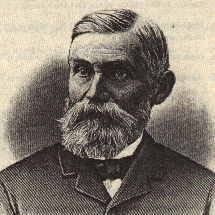

Children of Horace H. and Adelaide (Buck) Bigelow:
15182.4291 Adelaide Frances, b 24 Dec 1860 Marlborough; m 23 June 1886 George A. Stevens.
15182.4292t Irving Ellsworth, b 11 Nov 1862 Trenton. NJ; d_1939 Worcester; rn 17 Nov 1887 Lillian A. Drennan; 4 children.
15182.4293 Frank H., b 09 Feb 1875 Worcester.
Sources:
Bigelow Family Genealogy Vol II , p 327;
Howe, Bigelow Family of America;
miscellaneous sources and biographies.
Descendant notes:
Donald Ellsworth 12
Bigelow E-mail
dbigelow@alaska.net
Home Page.
In the spring of 1861, Horace Holly Bigelow and his wife
Adelaide E. Bigelow were enjoying their first child, daughter Adelaide
F. Bigelow, who had been born in Marlborough, Massachusetts the previous
December 24th. The baby was undoubtedly very welcomed by 33 year old Horace
and his 23 year old wife of two years. Horace previously had been married
to his first cousin Lucy Anne Howe, but she had died childless on September
25, 1857.
Horace had worked as a shoemaker for many years. He learned this trade from his father Levi in the family's home shoe shop. Early on Horace's creativity allowed him to invent heel pressing and nailing machines. With his entreprenurial talents he was able to build a substantial business in this industry. In fact, he is credited with laying the foundation of the mass-production shoe making industry in Massachusetts, and at one time owned a plant in Worcester which employed some 500 workers. Soon his shoemaking business had branches in New York and Rhode Island.
At Gettysburg, Pennsylvania in that spring of 1861 the Civil War broke out. As the fighting intensified, ever greater demand was placed upon manufacturers to meet the needs of their armies. In the North, the very high demand for shoes for soldiers prompted Horace to develop a shoe manufacturing facility in a New Jersey state prison to help meet that need.
At the outbreak of the war the North soon realized that it's capitol in Washington, D.C. was very vulnerable to attack from the forces of the South just across the Potomac River in Virginia. A 24 year old citizen-soldier, Colonel Elmer Ephraim Ellsworth, is credited with quickly organizing a regiment of New York City firemen to take on the defense of Washington. Ellsworth had studied law under President Lincloln and was highly regarded by him.
Soon after arriving in Washington, Colonel Ellsworth was given the mission of capturing Alexandria, Virginia. Upon entering Alexandria, Colonel Ellsworth saw the Confederate flag still flying over the Marshall House Hotel. With reckless bravery shown by many at the outset of the war, he ran to the rooftop and tore down the Confederate colors. Returning to the ground floor with the flag draped over his shoulder, he was gunned down by the furious owner of the hotel, James Jackson. Ellsworth's companion in this emotion charged attack was Corporal Francis E. Brownell. Brownell killed Jackson and then managed to escape with his own life. Colonel Ellsworth was the first Union officer killed in the war, and the story of his death had a profound effect on Horace and Adelaide Bigelow.
For a time Horace and his young family were living in Trenton, New Jersey where he oversaw the prison shoe manufacturing facility. While there, Adelaide and Horace's second child was born on November 11, 1862, a son whom they named Irving Ellsworth Bigelow in honor of the fallen Union hero, Colonel Elmer Ephraim Ellsworth.
For five generations the middle name Ellsworth has been
passed down. The youngest to receive this distinguished name is Vance Ellsworth
Bigelow, son of Derald Ellsworth Bigelow, son of Chester Ellsworth Bigelow,
Jr., son of Chester Ellsworth Bigelow, Sr., son of Irving Ellsworth Bigelow,
the son of Horace Holly Bigelow who started this legacy.

